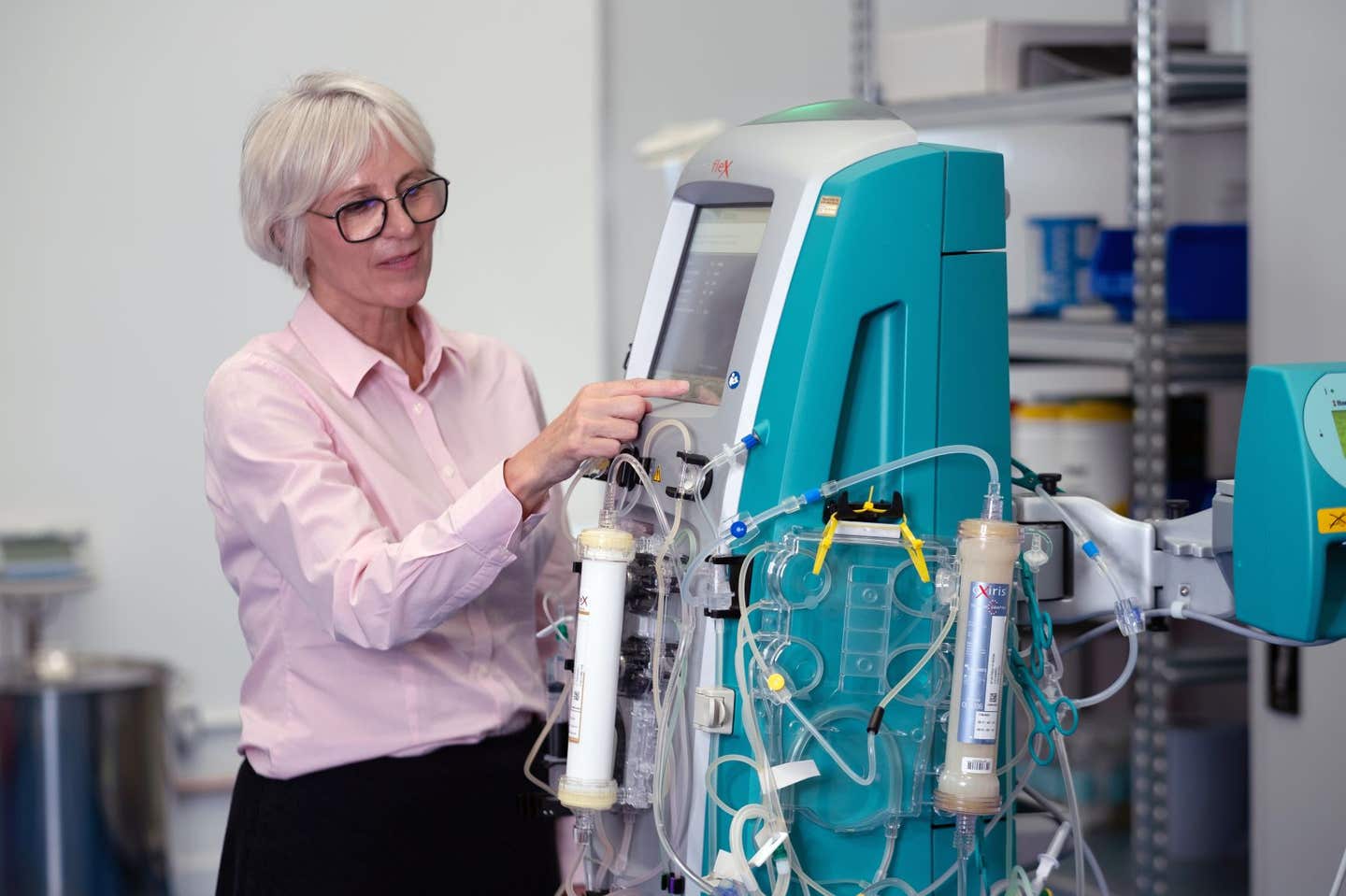The first successful in-patient trial of liver dialysis has been completed
In a world-first breakthrough for the medical community, the initial in-patient trial of liver dialysis* has been successfully completed.

[June 1, 2023: Staff Writer, The Brighter Side of News]
In a world-first breakthrough for the medical community, the initial in-patient trial of liver dialysis* has been successfully completed.(CREDIT: DIALIVE)
In a world-first breakthrough for the medical community, the initial in-patient trial of liver dialysis* has been successfully completed. The research spearheaded by University College London (UCL), in collaboration with the Royal Free Hospital, UCL's spin-off company, Yaqrit, and other affiliates has brought new hope to the fight against acute-on-chronic liver failure (ACLF).
The trailblazer at the core of the triumph is DIALIVE, an innovative device engineered by the researchers at UCL’s Institute for Liver and Digestive Health. This groundbreaking gadget demonstrated notable safety, along with substantial amelioration in the intensity of symptoms and organ functionality. Its effectiveness was observed in a larger percentage of patients with ACLF compared to those receiving the conventional treatment.
The breakthrough represents a significant stride in combating cirrhosis, a liver condition affecting approximately 100 million people globally. Notably, an estimated 10 million of those affected suffer from an additional complication alongside their cirrhosis. Among these, approximately three million individuals are diagnosed with ACLF. This malady may trigger a rapid decline in liver function, thereby elevating the risk of imminent death.
In the United Kingdom, the annual number of ACLF cases reaches around 15,000, costing the National Health Service approximately £100,000 per patient. Sadly, despite these steep expenditures, there has been little impact on the mortality risk of patients.
Related Stories:
The liver, with its complex nature and multifaceted functions, plays a pivotal role in our health. The intricate organ is tasked with over 500 functions, such as eliminating harmful substances from the bloodstream and nutrient absorption. A critical function of the liver is the production of a protein known as albumin, which acts as a 'mobile liver', absorbing undesired substances. However, this function is severely compromised in the case of ACLF due to the drastic reduction of albumin production caused by liver damage from alcohol abuse, obesity, or viral infections.
A perilous outcome of ACLF is the impairment of the gut leading to bacterial leakage into the bloodstream, which can trigger an inappropriate immune response and multiorgan failure. Designed to counteract these mortality-causing mechanisms, DIALIVE stepped into the scene as a promising solution.
This recent study is the pioneering randomised, controlled clinical trial of a liver dialysis device. The objective was to ascertain the safety of DIALIVE in the treatment of ACLF patients and to evaluate its clinical implications. In this trial, 32 patients were treated with either DIALIVE or the standard care for a maximum of five days, and the results were monitored at the tenth and the twenty-eighth day.
Graphical abstract of the trial. (CREDIT: Journal of Hepatology)
In a remarkable feat, DIALIVE treatment demonstrated significantly accelerated reversal of ACLF compared to the standard treatment, with a resolution of the condition in about twice the number of patients. This clinical improvement had a substantial influence on the underlying mechanisms responsible for ACLF development.
DIALIVE treatment was effective in drastically reducing endotoxins, which are released upon bacterial death, and it improved albumin functionality. Notably, biomarkers of systemic inflammation, such as cytokines, endothelial function, and markers of cell death, all witnessed improvement. Moreover, a treatment period as short as three days proved effective, with patients showing resolution of ACLF and remaining in remission for 28 days post-treatment.
These eight panels describe changes in albumin concentration and the functional domains that were measured in the DIALIVE and SOC groups at Days 0, 5 and 10. The data show that there was no significant difference in the albumin concentration either within the group nor between the groups. (CREDIT: Journal of Hepatology)
Chief Investigator of the DIALIVE trial from the Royal Free Hospital, Dr Banwari Agarwal, said: “It gives me enormous pleasure to see the promise of this novel liver dialysis device for the treatment of acute-on-chronic liver failure. The intervention has the potential to transform the care provided to the ever-increasing number of patients and their families suffering from the effects of living with what is essentially a terminal illness for many. It has the potential to transform the therapeutic options available to clinicians across the world for patients with ACLF.”
The ensuing step will be a more extensive trial with a larger patient population to verify DIALIVE’s safety and effectiveness. An additional measure to be evaluated is the impact of DIALIVE on patient mortality compared to other available treatments.
These six panels describe the effect of DIALIVE or SOC on individual organ functions There were significant improvements in the liver, kidney, coagulation, and brain sub scores in both groups but the changes in each of these subscores was significantly greater in the DIALIVE group at Day 10. (CREDIT: Journal of Hepatology)
One of the creators of DIALIVE, Professor Rajiv Jalan of UCL Institute for Liver and Digestive Health, said: “As academics it can be difficult to define a disease then translate this knowledge into a clinical solution that makes a real difference to people’s lives. So the results of the DIALIVE trial are an emotional moment, which wouldn’t have been possible without scientific collaboration between the UK, European colleagues and funding from the European Commission. My hope is that within a few years we will start to fulfil the urgent unmet need for treating acute-on-chronic liver failure and improve outcomes for patients.”
Carrie Morgan, Senior Vice President of Clinical Operations at Yaqrit, reiterated the positive sentiments: “We are at an exciting stage of the development of DIALIVE and the results of this trial are extremely encouraging. Our unwavering focus remains on putting the individual at the centre of our efforts, working tirelessly towards a brighter future for all those impacted by chronic liver disease.”
Significantly greater improvements in the CLIF-OF and CLIF-C ACLF scores were observed in the DIALIVE group at Day 10. Although ACLF grades were not statistically different between groups, there were greater proportion of patients in whom ACLF resolved at Day 10 (42.9% vs. 26.7%; p = 0.450) in the DIALIVE group, which was not statistically significant. (C) The time to resolution of ACLF was also significantly faster (log-rank p = 0.036). (CREDIT: Journal of Hepatology)
This trial is a triumphant milestone in a long journey embarked upon by researchers at UCL and the Royal Free Hospital. Their journey, which commenced in 2001 with the identification of ACLF as a distinct clinical entity, led to the invention of DIALIVE by Professors Rajiv Jalan and Nathan Davies.
The intellectual property behind the technology was patented by UCL in 2009 and licensed to their spin-off company, Yaqrit. The completion of this landmark trial was made possible by an EU Horizon 2020 grant, bolstered by support from NIHR and MRC for pre-clinical testing. The medical community eagerly anticipates the next phases of the DIALIVE project, holding high hopes for its future contribution to the treatment of ACLF.
* Dialysis is a technique to clean the blood of harmful substances, more familiar in the treatment of those with reduced or no kidney function. Kidney dialysis patients must undergo treatment for several hours each day in order to live. Due to the liver’s regenerative qualities, however, it is expected that liver dialysis will be able to provide longer term benefits after a short stint of treatment lasting several days.
Note: Materials provided above by The Brighter Side of News. Content may be edited for style and length.
Like these kind of feel good stories? Get the Brighter Side of News' newsletter.



